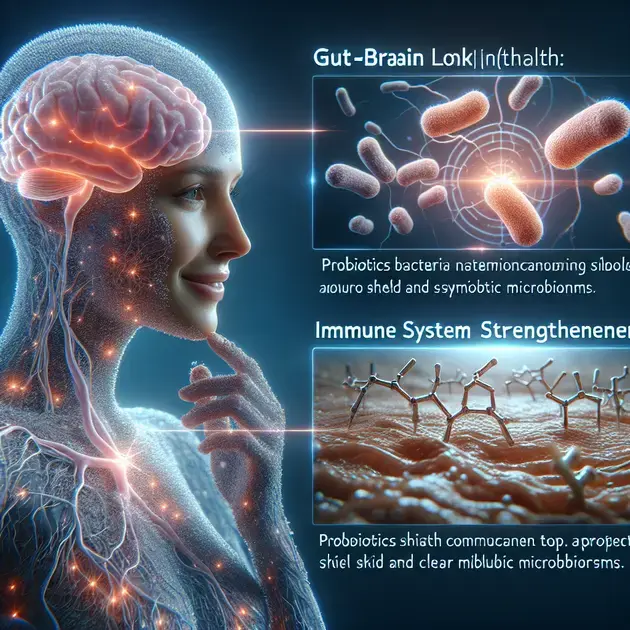Have you ever wondered about the benefits of probiotics and what they are good for? In today’s health-conscious society, probiotics have gained significant attention for their potential to improve digestive health and boost the immune system.
Research has shown that probiotics can also play a role in mental health, with studies indicating a possible link between gut health and mood regulation. As we continue exploring the world of probiotics, it’s clear that these beneficial bacteria offer a wide range of advantages beyond just digestion.

Unlocking the Power of Probiotics for Digestive Health
Probiotics are beneficial bacteria that can help improve digestive health by restoring the natural balance of gut flora. One way to unlock the power of probiotics for digestive health is by incorporating probiotic-rich foods into your diet. Foods like yogurt, kefir, sauerkraut, and miso are excellent sources of probiotics.
You can also take probiotic supplements to ensure you are getting an adequate amount of beneficial bacteria. Look for supplements that contain a variety of bacterial strains and have a high CFU (colony-forming units) count for maximum effectiveness. Websites like Healthline provide detailed reviews and information on different probiotic supplements available in the market.
In addition to consuming probiotics, it is essential to also feed the good bacteria in your gut with prebiotic foods. Foods like bananas, onions, garlic, and asparagus are rich in prebiotics and can help support the growth of probiotics in your digestive system. Including a combination of probiotic and prebiotic foods in your diet can optimize the benefits for your digestive health.
Another way to unlock the power of probiotics for digestive health is by reducing the consumption of processed foods and sugars. These foods can negatively impact the balance of gut flora, making it harder for probiotics to thrive. By focusing on a diet rich in whole foods and fiber, you can create a favorable environment for probiotics to flourish and promote better digestive function.
Lastly, staying hydrated is crucial for the effectiveness of probiotics in your gut. Drinking an adequate amount of water throughout the day can help support digestion and ensure that probiotics work optimally. Incorporating these habits into your daily routine can help unlock the power of probiotics for improved digestive health.
Enhancing Your Immune System with Probiotics
Probiotics play a significant role in supporting the immune system by promoting the growth of beneficial bacteria in the gut. To enhance your immune system with probiotics, consider incorporating immune-boosting probiotic strains like Lactobacillus rhamnosus and Bifidobacterium animalis into your daily routine. These strains have been shown to help strengthen the immune response.
One way to introduce these immune-boosting probiotics into your diet is by consuming yogurt or kefir that contains specific probiotic strains known for their immune-enhancing properties. Websites like WebMD provide information on the best probiotic strains for immune health and the foods that contain them.
In addition to consuming probiotic-rich foods, you can also explore probiotic supplements that are specifically formulated to support immune function. Look for supplements that are targeted towards immune health and contain strains known for their immune-boosting properties. Websites like Verywell Health offer reviews and recommendations for immune-supporting probiotic supplements.
It is important to note that maintaining a healthy lifestyle overall, including regular exercise, adequate sleep, and stress management, is essential for supporting your immune system. Probiotics can complement these healthy habits and provide additional support for a robust immune response.
By incorporating immune-enhancing probiotics into your daily routine, you can help strengthen your immune system and potentially reduce the risk of infections and illnesses. Consistency is key when it comes to enhancing your immune system with probiotics, so make it a part of your daily health regimen.
The Surprising Connection Between Probiotics and Mental Health
Research has uncovered a surprising connection between probiotics and mental health, highlighting the significant impact gut health can have on brain function and mood. To explore this connection, consider incorporating probiotic-rich foods into your diet that support both digestive and mental well-being.
Some probiotic strains, such as Lactobacillus and Bifidobacterium, have been linked to improved mood and reduced symptoms of anxiety and depression. By consuming foods like kimchi, tempeh, or kombucha that contain these beneficial bacteria, you may be able to support your mental health through your gut microbiome.
Websites like Psychology Today provide insights into the latest research on probiotics and mental health, showcasing how beneficial bacteria in the gut can communicate with the brain through the gut-brain axis. Understanding this connection can empower you to make informed choices about incorporating probiotics into your daily routine for mental well-being.
In addition to dietary sources of probiotics, you can also explore probiotic supplements that are formulated to support mood and cognitive function. Look for supplements that contain specific strains known for their positive effects on mental health and emotional well-being. Websites like Health.com offer reviews and recommendations for probiotic supplements geared towards mental wellness.
Alongside probiotics, maintaining a healthy lifestyle, including regular physical activity, mindfulness practices, and adequate sleep, can further support your mental health. By acknowledging the surprising connection between probiotics and mental well-being, you can take proactive steps to nurture both your gut and mind for overall wellness.

The Impact of Probiotics on Skin Health
Probiotics have gained significant attention for their beneficial effects on gut health, but their impact on skin health should not be overlooked. Research has shown that the balance of good and bad bacteria in the gut can directly influence the health and appearance of the skin. By consuming probiotics through supplements or fermented foods, individuals can help maintain a healthy gut microbiome, which in turn can lead to clearer, more radiant skin.
One study published in the journal Dermatology found that participants who took a probiotic supplement experienced a reduction in acne lesions and overall improvement in skin appearance. This suggests that probiotics can play a role in managing common skin conditions such as acne and eczema. Additionally, probiotics have anti-inflammatory properties that can help calm redness and irritation in the skin.
Furthermore, probiotics can boost the skin’s natural defenses by enhancing its barrier function. This leads to better protection against environmental aggressors such as UV radiation and pollution, ultimately helping to prevent premature aging and skin damage. Incorporating probiotics into your skincare routine can therefore benefit not only your gut health but also your skin health.
In conclusion, the impact of probiotics on skin health is becoming increasingly evident. By promoting a healthy gut microbiome and supporting the skin’s protective barrier, probiotics can help improve the overall appearance and resilience of the skin. Consider adding probiotic-rich foods or supplements to your daily regimen for a radiant complexion from the inside out.
Optimizing Athletic Performance with Probiotics
Athletes are constantly seeking ways to enhance their performance and recovery, and probiotics may offer a natural solution. Research has shown that the gut microbiome plays a crucial role in regulating energy metabolism, nutrient absorption, and immune function, all of which are essential for optimal athletic performance.
One study published in the Journal of Science and Medicine in Sport found that athletes who consumed probiotics experienced a reduction in exercise-induced inflammation and oxidative stress. This led to faster recovery times and improved endurance during training sessions. By maintaining a healthy balance of gut bacteria, athletes can potentially enhance their overall performance.
Furthermore, probiotics can help support a healthy immune system, reducing the risk of infections and illnesses that could sideline an athlete. A strong immune system is key for consistent training and competition, making probiotics a valuable addition to an athlete’s regimen.
Incorporating probiotic-rich foods such as yogurt, kefir, and kimchi into a balanced diet can help athletes reap the benefits of these beneficial bacteria. Additionally, probiotic supplements specifically formulated for athletes may provide a convenient way to ensure optimal gut health and performance.
In summary, optimizing athletic performance with probiotics is a promising strategy for athletes looking to improve their overall health and competitive edge. By supporting digestion, recovery, and immune function, probiotics can help athletes achieve their performance goals and maintain peak condition throughout their training and competition seasons.
Probiotics: A Natural Solution for Allergies
Allergies are a common health concern that can significantly impact quality of life, but probiotics may offer a natural solution for managing allergic symptoms. Research suggests that the gut microbiome plays a crucial role in immune regulation and tolerance, and disruptions in this balance can contribute to the development of allergic reactions.
One study published in the journal Allergy found that infants who were at high risk for developing allergies and received probiotics during the first six months of life had a reduced risk of developing allergic diseases such as eczema and asthma later in childhood. This highlights the potential of probiotics in modulating the immune system and preventing allergic sensitivities.
Furthermore, probiotics have been shown to have anti-inflammatory effects that can help alleviate symptoms of allergic rhinitis, such as sneezing, nasal congestion, and itchy eyes. By promoting a balanced immune response, probiotics may offer relief for individuals suffering from seasonal or environmental allergies.
Incorporating probiotics into the diet through supplementation or probiotic-rich foods can help support a healthy gut microbiome and strengthen immune function. This can potentially reduce the severity and frequency of allergic reactions, providing a natural and holistic approach to managing allergies.
In conclusion, probiotics offer a promising avenue for addressing allergic conditions by promoting immune tolerance and reducing inflammatory responses. By maintaining a healthy gut microbiome with probiotics, individuals may find relief from allergic symptoms and improve their overall quality of life. Consider incorporating probiotics into your daily routine as a natural solution for managing allergies.
Conclusion
Probiotics have emerged as a powerful ally for skin health, offering benefits beyond just gut wellness. Research underscores their ability to influence the balance of good and bad bacteria in the gut, directly impacting skin health. By incorporating probiotics into one’s routine through supplements or fermented foods, individuals can nurture a healthy gut microbiome, reflecting in clearer and more radiant skin.
Various studies support the positive effects of probiotics on skin health. From reducing acne lesions to calming redness and irritation, probiotics demonstrate their potential in managing common skin conditions like acne and eczema. Their anti-inflammatory properties further contribute to skin health by enhancing the skin’s natural defenses and protecting against environmental stressors, such as UV radiation and pollution.
In concluding thoughts, the significance of probiotics in promoting skin health stands out prominently. By fostering a healthy gut microbiome and fortifying the skin’s protective barrier, probiotics offer a holistic approach to enhancing skin appearance and resilience. Considering the inclusion of probiotic-rich foods or supplements in daily routines can pave the way for a glowing complexion from within, showcasing the profound impact of probiotics on skin health.



